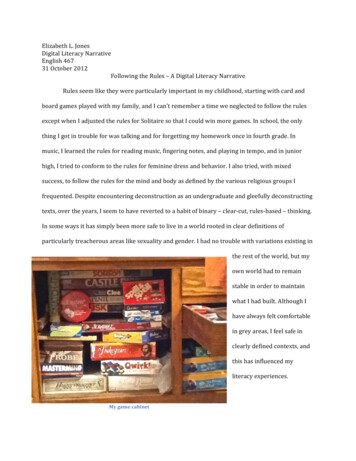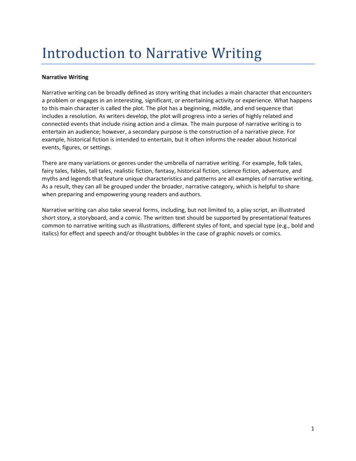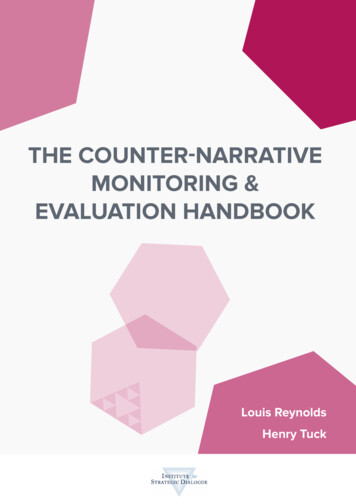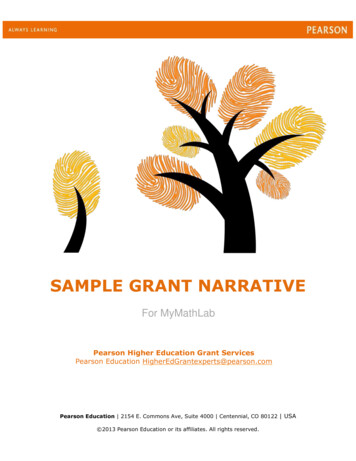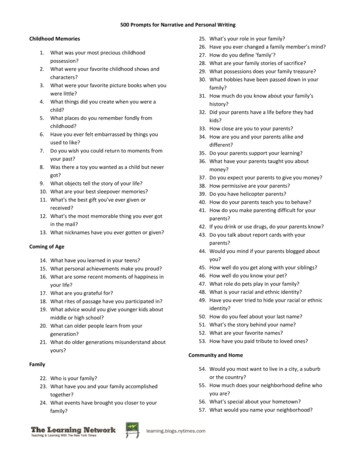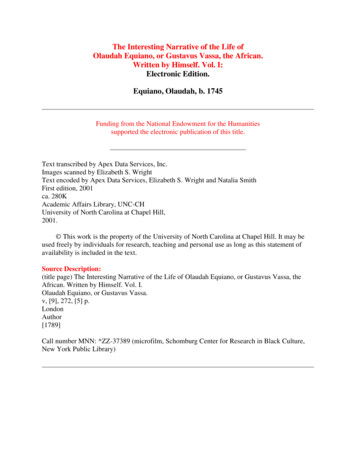
Transcription
The Interesting Narrative of the Life ofOlaudah Equiano, or Gustavus Vassa, the African.Written by Himself. Vol. I:Electronic Edition.Equiano, Olaudah, b. 1745Funding from the National Endowment for the Humanitiessupported the electronic publication of this title.Text transcribed by Apex Data Services, Inc.Images scanned by Elizabeth S. WrightText encoded by Apex Data Services, Elizabeth S. Wright and Natalia SmithFirst edition, 2001ca. 280KAcademic Affairs Library, UNC-CHUniversity of North Carolina at Chapel Hill,2001. This work is the property of the University of North Carolina at Chapel Hill. It may beused freely by individuals for research, teaching and personal use as long as this statement ofavailability is included in the text.Source Description:(title page) The Interesting Narrative of the Life of Olaudah Equiano, or Gustavus Vassa, theAfrican. Written by Himself. Vol. I.Olaudah Equiano, or Gustavus Vassa.v, [9], 272, [5] p.LondonAuthor[1789]Call number MNN: *ZZ-37389 (microfilm, Schomburg Center for Research in Black Culture,New York Public Library)
1CHAPTER I.I BELIEVE it is difficult for those who publish their own memoirs to escape the imputationof vanity; nor is this the only disadvantage under which they labour: it is also their misfortune,that what is uncommon is rarely, if ever, believed, and what is obvious we are apt to turn fromwith disgust, and to charge the writer with impertinence. People generally think those memoirsonly worthy to be read or remembered which abound in great or striking events, those, in short,which in a high degree excite either admiration or pity: all others they consign to contempt andoblivion. It is therefore, I confess, not a little hazardous in a private and obscure individual, and astranger too, thus to solicit the indulgent attention of the public; especially when I own I offerhere the history of neither a saint, a hero, nor a tyrant. I believe there are few events in my life,which have not happened to many: it is true the incidents of it are numerous; and, did I considermyself an European, I might say my sufferings were great: but when I compare my lot with thatof most of my countrymen, I regard myself as a particular favourite of Heaven, and acknowledgethe mercies of Providence in every occurrence of my life. If then the following narrative does notappear sufficiently interesting to engage general attention, let my motive be some excuse for itspublication. I am not so foolishly vain as to expect from it either immortality or literaryreputation. If it affords any satisfaction to my numerous friends, at whose request it has beenwritten, or in the smallest degree promotes the interests of humanity, the ends for which it wasundertaken will be fully attained, and every wish of my heart gratified. Let it therefore beremembered, that, in wishing to avoid censure, I do not aspire to praise.That part of Africa, known by the name of Guinea, to which the trade for slaves is carried on,extends along the coast above 3400 miles, from the Senegal to Angola, and includes a variety ofkingdoms. Of these the most considerable is the kingdom of Benen, both as to extent and wealth,the richness and cultivation of the soil, the power of its king, and the number and warlikedisposition of the inhabitants. It is situated nearly under the line, and extends along the coastabout 170 miles, but runs back into the interior part of Africa to a distance hitherto I believeunexplored by any traveller; and seems only terminated at length by the empire of Abyssinia,near 1500 miles from its beginning. This kingdom is divided into many provinces or districts: inone of the most remote and fertile of which, called Eboe, I was born, in the year 1745, in acharming fruitful vale, named Essaka. The distance of this province from the capital of Beninand the sea coast must be very considerable; for I had never heard of white men or Europeans,nor of the sea: and our subjection to the king of Benin was little more than nominal; for everytransaction of the government, as far as my slender observation extended, was conducted by thechiefs or elders of the place. The manners and government of a people who have little commercewith other countries are generally very simple; and the history of what passes in one family orvillage may serve as a specimen of a nation. My father was one of those elders or chiefs I havespoken of, and was styled Embrenche; a term, as I remember, importing the highest distinction,and signifying in our language a mark of grandeur. This mark is conferred on the person entitledto it, by cutting the skin across at the top of the forehead, and drawing it down to the eye-brows;and while it is in this situation applying a warm hand, and rubbing it until it shrinks up into athick weal across the lower part of the forehead. Most of the judges and senators were thusmarked; my father had long born it: I had seen it conferred on one of my brothers, and I was alsodestined to receive it by my parents. Those Embrence, or chief men, decided disputes andpunished crimes; for which purpose they always assembled together. The proceedings were
2generally short; and in most cases the law of retaliation prevailed. I remember a man wasbrought before my father, and the other judges, for kidnapping a boy; and, although he was theson of a chief or senator, he was condemned to make recompense by a man or woman slave.Adultery, however, was sometimes punished with slavery or death; a punishment which I believeis inflicted on it throughout most of the nations of Africa 1*:so sacred among them is the honourof the marriage bed, and so jealous are they of the fidelity of their wives. Of this I recollect aninstance:--a woman was convicted before the judges of adultery, and delivered over, as thecustom was, to her husband to be punished. Accordingly he determined to put her to death: but itbeing found, just before her execution, that she had an infant at her breast; and no woman beingprevailed on to perform the part of a nurse, she was spared on account of the child. The men,however, do not preserve the same constancy to their wives, which they expect from them; forthey indulge in a plurality, though seldom in more than two. Their mode of marriage is thus:-both parties are usually betrothed when young by their parents, (though I have known the malesto betroth themselves). On this occasion a feast is prepared, and the bride and bridegroom standup in the midst of all their friends, who are assembled for the purpose, while he declares she isthenceforth to be looked upon as his wife, and that no other person is to pay any addresses to her.This is also immediately proclaimed in the vicinity, on which the bride retires from the assembly.Some time after she is brought home to her husband, and then another feast is made, to which therelations of both parties are invited: her parents then deliver her to the bridegroom, accompaniedwith a number of blessings, and at the same time they tie round her waist a cotton string of thethickness of a goose-quill, which none but married women are permitted to wear: she is nowconsidered as completely his wife; and at this time the dowry is given to the new married pair,which generally consists of portions of land, slaves, and cattle, household goods, and implementsof husbandry. These are offered by the friends of both parties; besides which the parents of thebride-groom present gifts to those of the bride, whose property she is looked upon beforemarriage; but after it she is esteemed the sole property of her husband. The ceremony being nowended the festival begins, which is celebrated with bonefires, and loud acclamations of joy,accompanied with music and dancing.We are almost a nation of dancers, musicians, and poets. Thus every great event, such as atriumphant return from battle, or other cause of public rejoicing is celebrated in public dances,which are accompanied with songs and music suited to the occasion. The assembly is separatedinto four divisions, which dance either apart or in succession, and each with a character peculiarto itself. The first division contains the married men, who in their dances frequently exhibit seatsof arms, and the representation of a battle. To these succeed the married women, who dance inthe second division. The young men occupy the third; and the maidens the fourth. Eachrepresents some interesting scene of real life, such as a great achievement, domesticemployment, a pathetic story, or some rural sport; and as the subject is generally founded onsome recent event, it is therefore ever new. This gives our dances a spirit and variety which Ihave scarcely seen elsewhere 2*. We have many musical instruments, particularly drums ofdifferent kinds, a piece of music which resembles a guitar, and another much like a stickado.These last are chiefly used by betrothed virgins, who play on them on all grand festivals.12* See Benezet's " Account of Guinea" throughout* When I was in Smyrna I have frequently seen the Greeks dance after this manner.
3As our manners are simple, our luxuries are few. The dress of both sexes is nearly the same.It generally consists of a long piece of callico, or muslin, wrapped loosely round the body,somewhat in the form of a highland plaid. This is usually dyed blue, which is our favouritecolour. It is extracted from a berry, and is brighter and richer than any I have seen in Europe.Besides this, our women of distinction wear golden ornaments; which they dispose with someprofusion on their arms and legs. When our women are not employed with the men in tillage,their usual occupation is spinning and weaving cotton, which they afterwards dye, and make itinto garments. They also manufacture earthen vessels, of which we have many kinds. Among therest tobacco pipes, made after the same fashion, and used in the same manner, as those inTurkey 3*.Our manner of living is entirely plain; for as yet the natives are unacquainted with thoserefinements in cookery which debauch the taste: bullocks, goats, and poultry, supply the greatestpart of their food. These constitute likewise the principal wealth of the country, and the chiefarticles of its commerce. The flesh is usually stewed in a pan; to make it savoury we sometimesuse also pepper, and other spices, and we have salt made of wood ashes. Our vegetables aremostly plantains, eadas, yams, beans, and Indian corn. The head of the family usually eats alone;his wives and slaves have also their separate tables. Before we taste food we always wash ourhands: indeed our cleanliness on all occasions is extreme; but on this it is an indispensableceremony. After washing, libation is made, by pouring out a small portion of the food, in acertain place, for the spirits of departed relations, which the natives suppose to preside over theirconduct, and guard them from evil. They are totally unacquainted with strong or spirituousliquours; and their principal beverage is palm wine. This is gotten from a tree of that name bytapping it at the top, and fastening a large gourd to it; and sometimes one tree will yield three orfour gallons in a night. When just drawn it is of a most delicious sweetness; but in a few days itacquires a tartish and more spirituous flavour; though I never saw any one intoxicated by it. Thesame tree also produces nuts and oil. Our principal luxury is in perfumes; one sort of these is anodoriferous wood of delicious fragrance: the other a kind of earth; a small portion of whichthrown into the fire diffuses a most powerful odour 4*. We beat this wood into powder, and mix itwith palm oil; with which both men and women perfume themselves.In our buildings we study convenience rather than ornament. Each master of a family has alarge square piece of ground, surrounded with a moat or fence, or enclosed with a wall made ofred earth tempered; which, when dry, is as hard as brick. Within this are his houses toaccommodate his family and slaves; which, if numerous, frequently present the appearance of avillage. In the middle stands the principal building, appropriated to the sole use of the master,and consisting of two apartments; in one of which he sits in the day with his family, the other isleft apart for the reception of his friends. He has besides these a distinct apartment in which he3* The bowl is earthen, curiously figured, to which a long reed is fixed as a tube. This tube is sometimes so long asto be born by one, and frequently out of grandeur by two boys.4* When I was in Smyrna I saw the same kind of earth; and brought some of it with me to England; itresembles musk in strength, but is more delicious in scent, and is not unlike the smell of a rose.
4sleeps, together with his male children. On each side are the apartments of his wives, who havealso their separate day and night houses. The habitations of the slaves and their families aredistributed throughout the rest of the enclosure. These houses never exceed one story in height:they are always built of wood, or stakes driven into the ground, crossed with wattles, and neatlyplastered within, and without. The roof is thatched with reeds. Our day-houses are left open atthe sides; but those in which we sleep are always covered, and plastered in the inside, with acomposition mixed with cowdung, to keep off the different insects, which annoy us during thenight. The walls and floors also of these are generally covered with mats. Our beds consist of aplatform, raised three or four feet from the ground, on which are laid skins, and different parts ofa spungy tree called plaintain. Our covering is calico or muslin, the same as our dress. The usualseats are a few logs of wood; but we have benches, which are generally perfumed, toaccommodate strangers: these compose the greater part of our household furniture. Houses soconstructed and furnished require but little skill to erect them. Every man is a sufficient architectfor the purpose. The whole neighbourhood afford their unanimous assistance in building themand in return receive, and expect no other recompense than a feast.As we live in a country where nature is prodigal of her favours, our wants are few andeasily supplied; of course we have few manufactures. They consist for the most part of calicoes,earthern ware, ornaments, and instruments of war and husbandry. But these make no part of ourcommerce, the principal articles of which, as I have observed, are provisions. In such a statemoney is of little use; however we have some small pieces of coin, if I may call them such. Theyare made something like an anchor; but I do not remember either their value or denomination.We have also markets, at which I have been frequently with my mother. These are sometimesvisited by stout mahogany-coloured men from the south west of us: we call them Oye-Eboe,which term signifies red men living at a distance. They generally bring us fire-arms, gunpowder,hats, beads, and dried fish. The last we esteemed a great rarity, as our waters were only brooksand springs. These articles they barter with us for odoriferous woods and earth, and our salt ofwood ashes. They always carry slaves through our land; but the strictest account is exacted oftheir manner of procuring them before they are suffered to pass. Sometimes indeed we soldslaves to them, but they were only prisoners of war, or such among us as had been convicted ofkidnapping, or adultery, and some other crimes, which we esteemed heinous. This practice ofkidnapping induces me to think, that, notwithstanding all our strictness, their principal businessamong us was to trepan our people. I remember too they carried great sacks along with them,which not long after I had an opportunity of fatally seeing applied to that infamous purpose.Our land is uncommonly rich and fruitful, and produces all kinds of vegetables in greatabundance. We have plenty of Indian corn, and vast quantities of cotton and tobacco. Our pineapples grow without culture; they are about the size of the largest sugar-loaf, and finelyflavoured. We have also spices of different kinds, particularly pepper; and a variety of deliciousfruits which I have never seen in Europe; together with gums of various kinds, and honey inabundance. All our industry is exerted to improve those blessings of nature. Agriculture is ourchief employment; and every one, even the children and women, are engaged in it. Thus we areall habituated to labour from our earliest years. Every one contributes something to the commonstock; and as we are unacquainted with idleness, we have no beggars. The benefits of such amode of living are obvious. The West India planters prefer the slaves of Benin or Eboe to thoseof any other part of Guinea, for their hardiness, intelligence, integrity, and zeal. Those benefits
5are felt by us in the general healthiness of the people, and in their vigour and activity; I mighthave added too in their comeliness. Deformity is indeed unknown amongst us, I mean that ofshape. Numbers of the natives of Eboe now in London might be brought in support of thisassertion: for, in regard to complexion, ideas of beauty are wholly relative. I remember while inAfrica to have seen three negro children, who were tawny, and another quite white, who wereuniversally regarded by myself, and the natives in general, as far as related to their complexions,deformed. Our women too were in my eyes at least uncommonly graceful, alert, and modest to adegree of bashfulness; nor do I remember to have ever heard of an instance of incontinenceamongst them before marriage. They are also remarkably cheerful. Indeed cheerfulness andaffability are two of the leading characteristics of our nation.Our tillage is exercised in a large plain or common, some hours walk from our dwellings,and all the neighbours resort thither in a body. They use no beasts of husbandry; and their onlyinstruments are hoes, axes, shovels, and beaks, or pointed iron to dig with. Sometimes we arevisited by locusts, which come in large clouds, so as to darken the air, and destroy our harvest.This however happens rarely, but when it does, a famine is produced by it. I remember aninstance or two wherein this happened. This common is often the theatre of war; and thereforewhen our people go out to till their land, they not only go in a body, but generally take their armswith them for fear of a surprise; and when they apprehend an invasion they guard the avenues totheir dwellings, by driving sticks into the ground, which are so sharp at one end as to pierce thefoot, and are generally dipt in poison. From what I can recollect of these battles, they appear tohave been irruptions of one little state or district on the other, to obtain prisoners or booty.Perhaps they were incited to this by those traders who brought the European goods I mentionedamongst us. Such a mode of obtaining slaves in Africa is common; and I believe more areprocured this way, and by kidnaping, than any other 5*. When a trader wants slaves, he applies toa chief for them, and tempts him with his wares. It is not extraordinary, if on this occasion heyields to the temptation with as little firmness, and accepts the price of his fellow creatures’liberty with as little reluctance as the enlightened merchant. Accordingly he falls on hisneighbours, and a desperate battle ensues. If he prevails and takes prisoners, he gratifies hisavarice by selling them; but, if his party be vanquished, and he falls into the hands of the enemy,he is put to death: for, as he has been known to foment their quarrels, it is thought dangerous tolet him survive, and no ransom can save him, though all other prisoners may be redeemed. Wehave fire-arms, bows and arrows, broad two-edged swords and javelins: we have shields alsowhich cover a man from head to foot. All are taught the use of these weapons; even our womenare warriors, and march boldly out to fight along with the men. Our whole district is a kind ofmilitia: on a certain signal given, such as the firing of a gun at night, they all rise in arms andrush upon their enemy. It is perhaps something remarkable, that when our people march to thefield a red flag or banner is borne before them. I was once a witness to a battle in our common.We had been all at work in it one day as usual, when our people were suddenly attacked. Iclimbed a tree at some distance, from which I beheld the fight. There were many women as wellas men on both sides; among others my mother was there, and armed with a broad sword. Afterfighting for a considerable time with great fury, and after many had been killed our people5* See Benezet's Account of Africa throughout.
6obtained the victory, and took their enemy's Chief prisoner. He was carried off in great triumph,and, though he offered a large ransom for his life, he was put to death. A virgin of note amongour enemies had been slain in the battle, and her arm was exposed in our market-place, whereour trophies were always exhibited. The spoils were divided according to the merit of thewarriors. Those prisoners which were not sold or redeemed we kept as slaves: but how differentwas their condition from that of the slaves in the West Indies! With us they do no more workthan other members of the community, even their masters; their food, clothing and lodging werenearly the same as theirs, (except that they were not permitted to eat with those who were freeborn); and there was scarce any other difference between them, than a superior degree ofimportance which the head of a family possesses in our state, and that authority which, as such,he exercises over every part of his household. Some of these slaves have even slaves under themas their own property, and for their own use.**************I have before remarked that the natives of this part of Africa are extremely cleanly. Thisnecessary habit of decency was with us a part of religion, and therefore we had manypurifications and washings; indeed almost as many, and used on the same occasions, if myrecollection does not fail me, as the Jews. Those that touched the dead at any time were obligedto wash and purify themselves before they could enter a dwelling-house. Every woman too, atcertain times, was forbidden to come into a dwelling-house, or touch any person, or any thing weate. I was so fond of my mother I could not keep from her, or avoid touching her at some ofthose periods, in consequence of which I was obliged to be kept out with her, in a little housemade for that purpose, till offering was made, and then we were purified.Though we had no places of public worship, we had priests and magicians, or wise men. Ido not remember whether they had different offices, or whether they were united in the samepersons, but they were held in great reverence by the people. They calculated our time, andforetold events, as their name imported, for we called them Ah-affoe-way-cah, which signifiescalculators or yearly men, our year being called Ah-affoe. They wore their beards, and when theydied they were succeeded by their sons. Most of their implements and things of value wereinterred along with them. Pipes and tobacco were also put into the grave with the corpse, whichwas always perfumed and ornamented, and animals were offered in sacrifice to them. Noneaccompanied their funerals but those of the same profession or tribe. These buried them aftersunset, and always returned from the grave by a different way from that which they went.These magicians were also our doctors or physicians. They practised bleeding by cupping;and were very successful in healing wounds and expelling poisons. They had likewise someextraordinary method of discovering jealously, theft, and poisoning; the success of which nodoubt they derived from their unbounded influence over the credulity and superstition of thepeople. I do not remember what those methods were, except that as to poisoning: I recollect aninstance or two, which I hope it will not be deemed impertinent here to insert, as it may serve asa kind of specimen of the rest, and is still used by the negroes in the West Indies. A virgin hadbeen poisoned, but it was not known by whom: the doctors ordered the corpse to be taken up bysome persons, and carried to the grave. As soon as the bearers had raised it on their shoulders,
7they seemed seized with some 6 *sudden impulse, and ran to and fro unable to stop themselves. Atlast, after having passed through a number of thorns and prickly bushes unhurt, the corpse fellfrom them close to a house, and defaced it in the fall; and, the owner being taken up, heimmediately confessed the poisoning 7*.*********These instances, and a great many more which might be adduced, while they shew how thecomplexions of the same persons vary in different climates, it is hoped may tend also to removethe prejudice that some conceive against the natives of Africa on account of their colour. Surelythe minds of the Spaniards did not change with their complexions! Are there not causes enoughto which the apparent inferiority of an African may be ascribed, without limiting the goodness ofGod, and supposing he forbore to stamp understanding on certainly his own image, because"carved in ebony." Might it not naturally be ascribed to their situation? When they come amongEuropeans, they are ignorant of their language, religion, manners, and customs. Are any painstaken to teach them these? Are they treated as men? Does not slavery itself depress the mind, andextinguish all its fire and every noble sentiment? But, above all, what advantages do not a refinedpeople possess over those who are rude and uncultivated. Let the polished and haughty Europeanrecollect that his ancestors were once, like the Africans, uncivilized, and even barbarous. DidNature make them inferior to their sons? and should they too have been made slaves? Everyrational mind answers, No. Let such reflections as these melt the pride of their superiority intosympathy for the wants and miseries of their sable brethren, and compel them to acknowledge,that understanding is not confined to feature or colour. If, when they look round the world, theyfeel exultation, let it be tempered with benevolence to others, and gratitude to God, "who hathmade of one blood all nations of men for to dwell on all the face of the earth*8;and whose wisdom is not our wisdom, neither are our ways his ways."6* See also Leut. Matthew's Voyage, p. 123.7* An instance of this kind happened at Montserrat in the West Indies in the year 1763. I then belonged to theCharming Sally, Capt. Doran.--The chief mate, Mr. Mansfield, and some of the crew being one day on shore, werepresent at the burying of a poisoned negro girl. Though they had often heard of the circumstance of the running insuch cases, and had even seen it, they imagined it to be a trick of the corpse-bearers. The mate therefore desired twoof the sailors to take up the coffin, and carry it to the grave. The sailors, who were all of the same opinion, readilyobeyed; but they had scarcely raised it to their shoulders, before they began to run furiously about, quite unable todirect themselves, till, at last, without intention, they came to the hut of him who had poisoned the girl. The coffinthen immediately fell from their shoulders against the hut, and damaged part of the wall. The owner of the hut wastaken into custody on this, and confessed the poisoning.--I give this story as it was related by the mate and crew ontheir return to the ship. The credit which is due to it I leave with the reader.8* Acts, c. xvii, v. 26.
8CHAP. II.I HOPE the reader will not think I have trespassed on his patience in introducing myself tohim with some account of the manners and customs of my country. They had been implanted inme with great care, and made an impression on my mind, which time could not erase, and whichall the adversity and variety of fortune I have since experienced served only to rivet and record;for, whether the love of one's country be real or imaginary, or a lesson of reason, or an instinct ofnature, I still look back with pleasure on the first scenes of my life, though that pleasure has beenfor the most part mingled with sorrow.I have already acquainted the reader with the time and place of my birth. My father, besidesmany slaves, had a numerous family, of which seven lived to grow up, including myself and asister, who was the only daughter. As I was the youngest of the sons, I became, of course, thegreatest favourite with my mother, and was always with her; and she used to take particular painsto form my mind. I was trained up from my earliest years in the art of war; my daily exercise wasshooting and throwing javelins; and my mother adorned me with emblems, after the manner ofour greatest warriors. In this way I grew up till I was turned the age of eleven, when an end wasput to my happiness in the following manner:--Generally when the grown people in theneighbourhood were gone far in the fields to labour, the children assembled together in some ofthe neighbours' premises to play; and commonly some of us used to get up a tree to look out forany assailant, or kidnapper, that might come upon us; for they sometimes took thoseopportunities of our parents' absence to attack and carry off as many as they could seize. Oneday, as I was watching at the top of a tree in our yard, I saw one of those people come into theyard of our next neighbour but one, to kidnap, there being many stout young people in it.Immediately on this I gave the alarm of the rogue, and he was surrounded by the stoutest ofthem, who entangled him with cords, so that he could not escape till some of the grown peoplecame and secured him. But alas! ere long it was my fate to be thus attacked, and to be carried off,when none of the grown people were nigh. One day, when all our people were gone out to theirworks as usual, and only I and my dear sister were left to mind the house, two men and a womangot over our walls, and in a mom
unexplored by any traveller; and seems only terminated at length by the empire of Abyssinia, near 1500 miles from its beginning. This kingdom is divided into many provinces or districts: in one of the most remote and fertile of which, called Eboe, I was born, in




